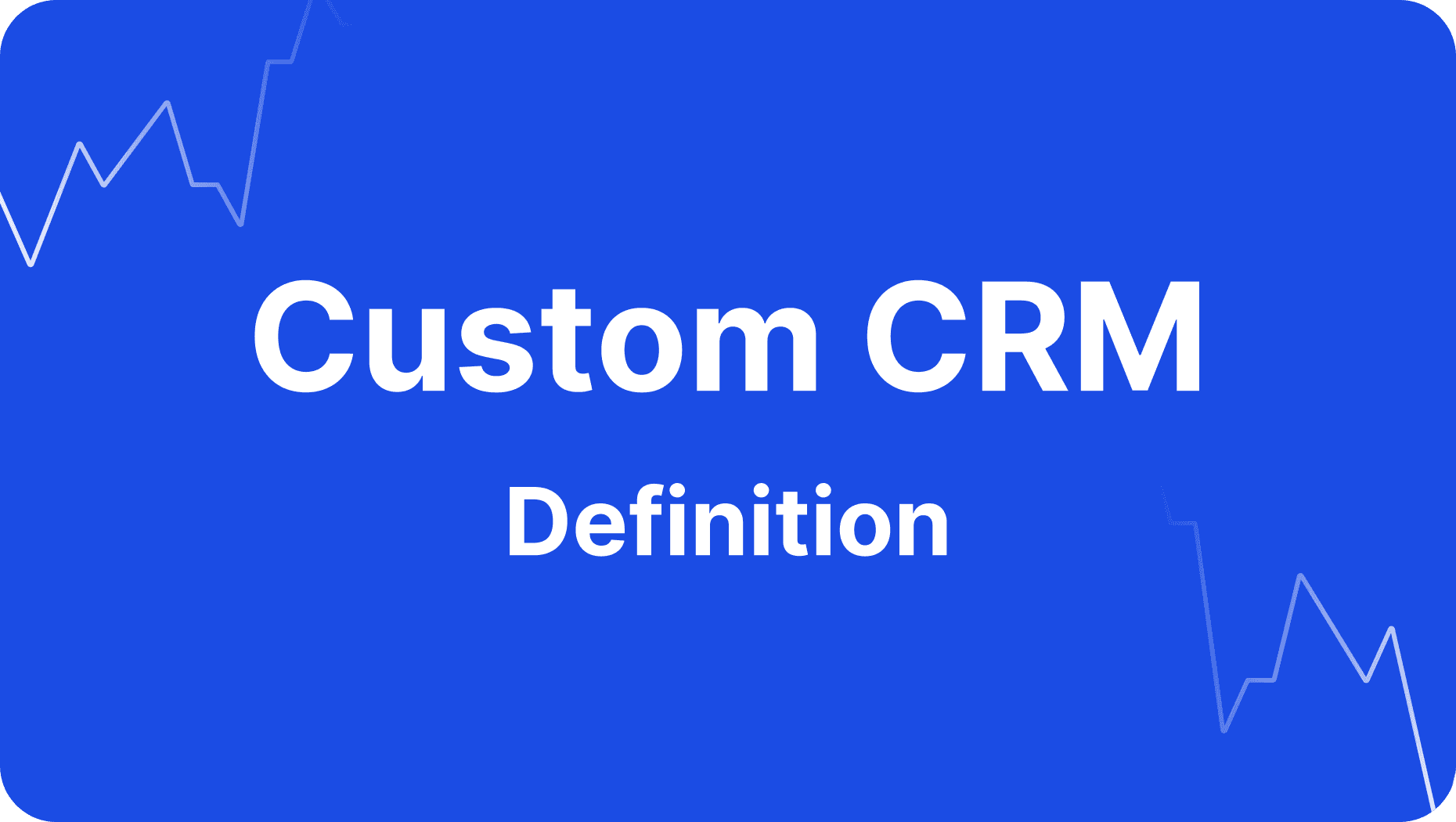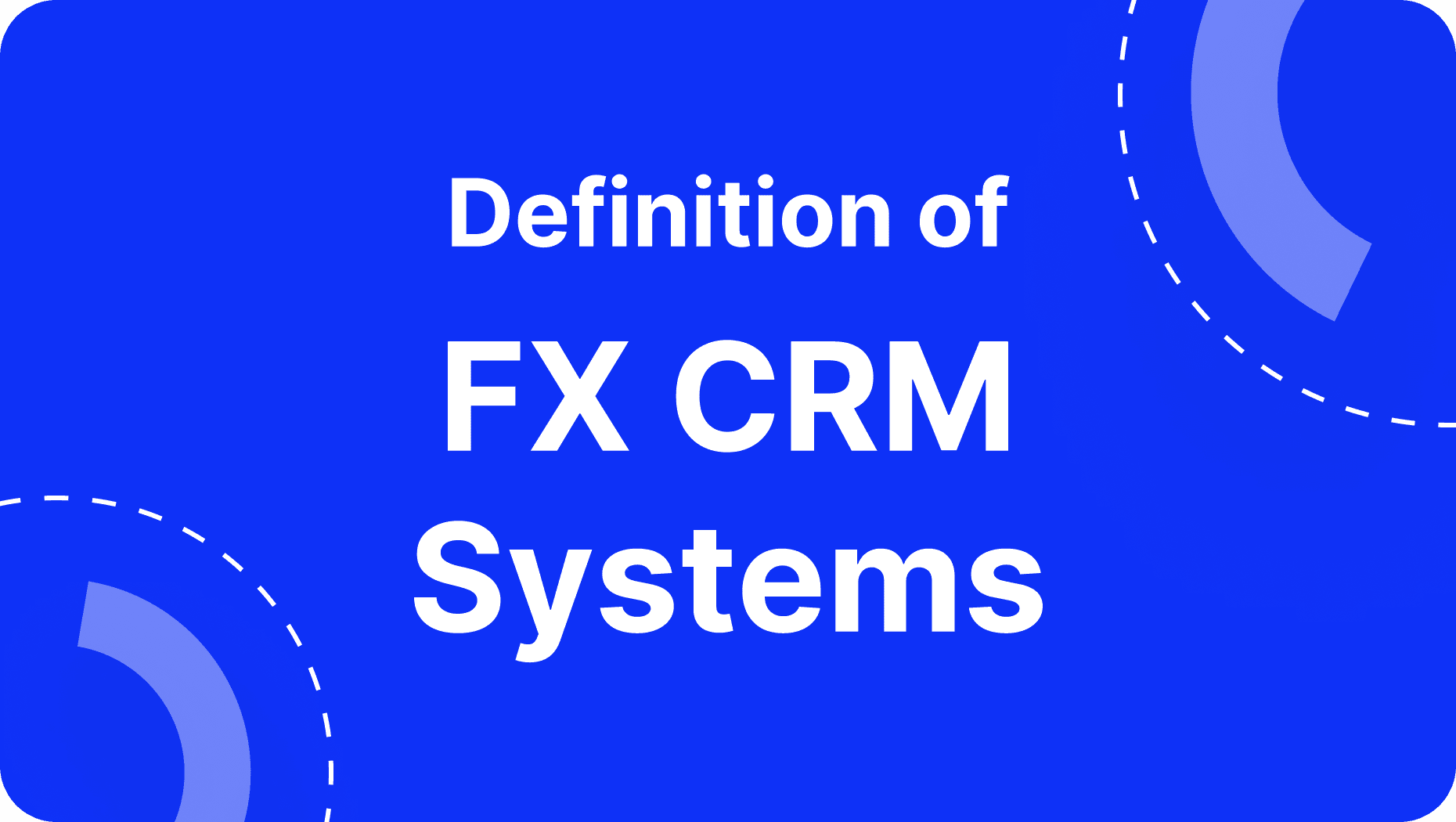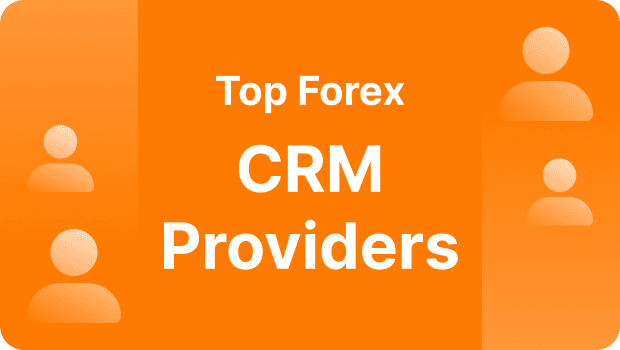Share
0
/5
(
0
)
A CRM, or customer relationship management system, aims to organise and manage client interactions. Its main goals are improving consumer interactions and boosting corporate performance.
Ready-made CRM solutions are widely applicable platforms. Conversely, a custom system is a specially designed solution created to satisfy specific business requirements.
Custom CRM software is becoming increasingly popular in sectors like trading and banking, where accurate client data management and intricate sales procedures are essential.
This article defines a custom CRM, describes its operation, and discusses its benefits for brokers, broking owners, and traders.
Key Takeaways
Custom CRMs are perfect for companies with complex sales processes and unique workflows because they offer flexibility, scalability, and tailored features.
Compared to conventional options, custom solutions offer greater customisation and integration but are more costly and time-consuming to design.
The cost of creating a custom CRM can range from $30,000 to $600,000. However, pre-made solutions are available for quicker implementation.
Definition and Overview of a Custom CRM
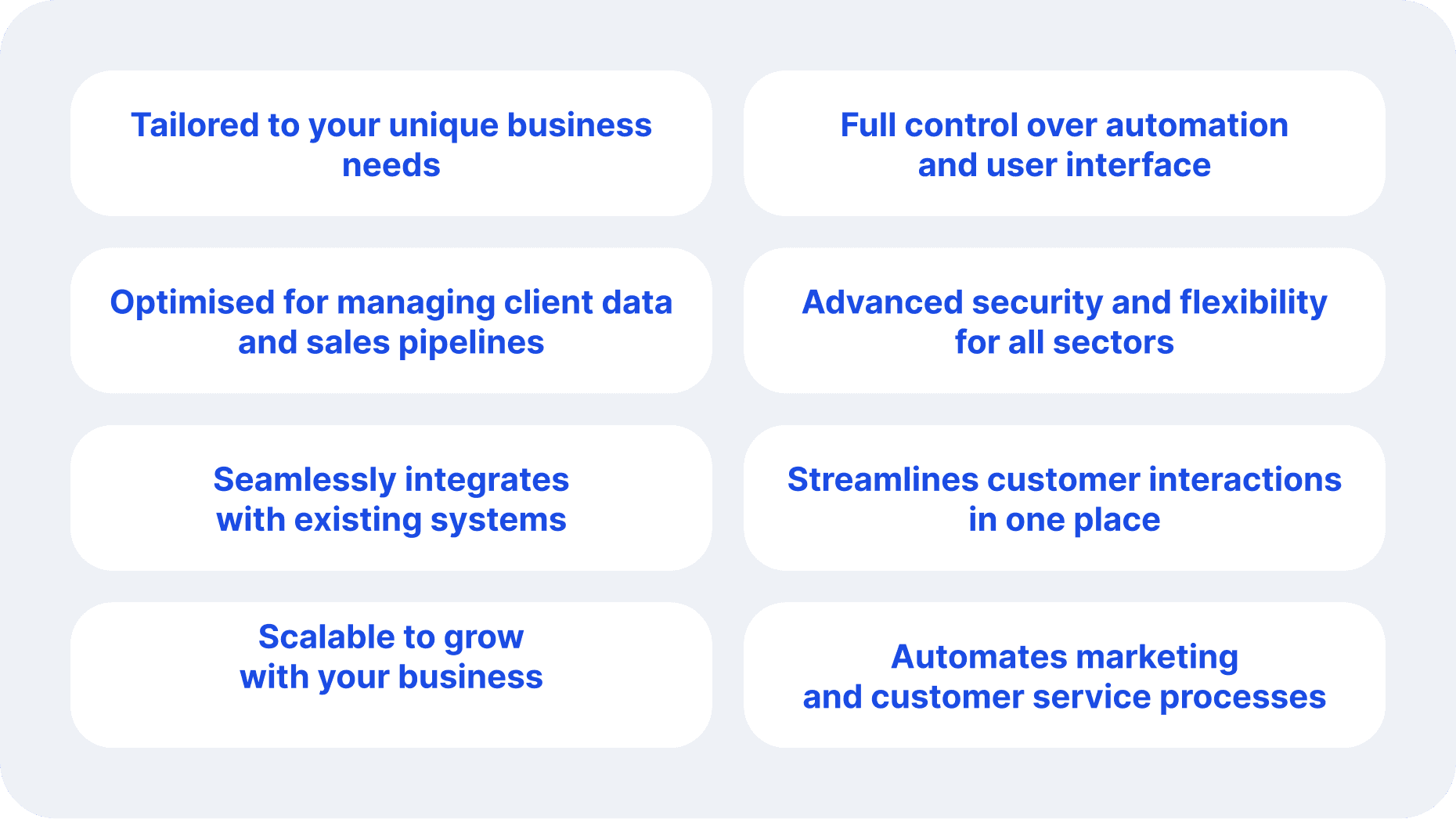
A custom CRM software program meets an organisation's unique business requirements. Custom CRM software is made to match particular workflows, procedures, and objectives, in contrast to off-the-shelf alternatives, which are pre-built systems with standardised functionality.
Building a platform from the ground up is known as custom CRM development, and in-house software developers or a contracted development team. The final system is optimised to manage client data, business operations, and intricate sales models unique to the company, and it easily connects with current systems.
CRM systems are designed for broad usage and provide a range of sectors with basic functionalities. These systems are frequently somewhat adaptable, enabling companies to change specific components. They do not, however, have the full capability and flexibility of a customised solution.
Custom CRM solutions are advantageous due to their flexibility and scalability. Companies can customise a platform to fit their operations and grow the system as their requirements change. Additionally, custom-built CRMs provide complete control over process automation and user interface design, smooth connectivity with other software, and advanced safety features.
Let's say you are a startup developing a brand-new piece of software. As the number of leads you receive increases, it's getting harder to keep track of each one, their interests, and where they are in the purchasing process. You presently handle everything via emails and spreadsheets, which are becoming less effective.
Here's where CRM solution comes into play. You may manage and arrange all of your customer interactions in one location with the aid of digital technology with this system.
Let's see how it works:
You can record and preserve data on possible clients, such as their contact information, business details, and particular requirements.
By visualising the sales pipeline, you can monitor each deal's development from the first point of contact to the closed agreement.
To forecast future sales and revenue, you can examine previous data.
Marketing activities such as social media posting and email campaigns can be automated.
You can record and monitor customer service tickets, guaranteeing prompt response.
How to Develop a Custom CRM
There are a few essential steps to follow: First, establish the precise goals for creating a unique CRM. Then, determine how the CRM will meet your company's needs, boost customer interaction, increase revenue, and simplify operations. Possible objectives include automating monotonous operations, enhancing data security, monitoring consumer behaviour, and guaranteeing smooth connection with current systems.
Choose the CRM type according to your objectives:
Collaborative: aimed at enhancing cooperation and exchanging useful client information.
Operational: Made to automate repetitive chores and simplify intricate sales processes.
Analytical: Examines consumer behaviour and information to improve sales funnels and marketing tactics.
Select CRM Features
Determine the features that are necessary to suit your business needs. Among the primary functionalities are:
Contact management: Keep track of and arrange client information to improve communications with customer support.
Task automation: Automate routine processes such as data entry and email follow-up.
Analytics and reporting: Learn about customer behaviour and sales performance.
Lead management: Monitor and oversee leads throughout the sales funnel.
Workflow automation: Simplify corporate procedures to increase productivity.
Integration: Verify that it works with current systems, including project management software.
Create a User-Centric Interface
Ensure your interface is easy for your customer support representatives, sales teams, and other users. Provide possibilities for customisation and logically arrange pertinent info. Give priority to frequently used features and ensure they work on both desktop and mobile platforms.
Develop the CRM System
Make a thorough technical specification that outlines the needs for integration, database design, and architecture.
Plan your data migration from current systems to prevent losing important client information.
Implement modern security measures to protect client information and guarantee legal compliance.
Create APIs to interact smoothly with external programs or project management software.
Extensive testing is done to find and fix defects, performance difficulties, and usability concerns.
Deploy and Educate Users
Implement a phased rollout strategy for the CRM. Provide specialised training materials and tools to help users comprehend the capabilities and optimise business performance. Adapt training to your team's particular roles and responsibilities.
Assure Continued Assistance and Updates
Provide ongoing technical assistance to resolve problems and guarantee system stability. Update the software frequently to accommodate changing business requirements, enhance data security, and adjust to emerging patterns in customer behaviour.
Custom CRM Development Cost
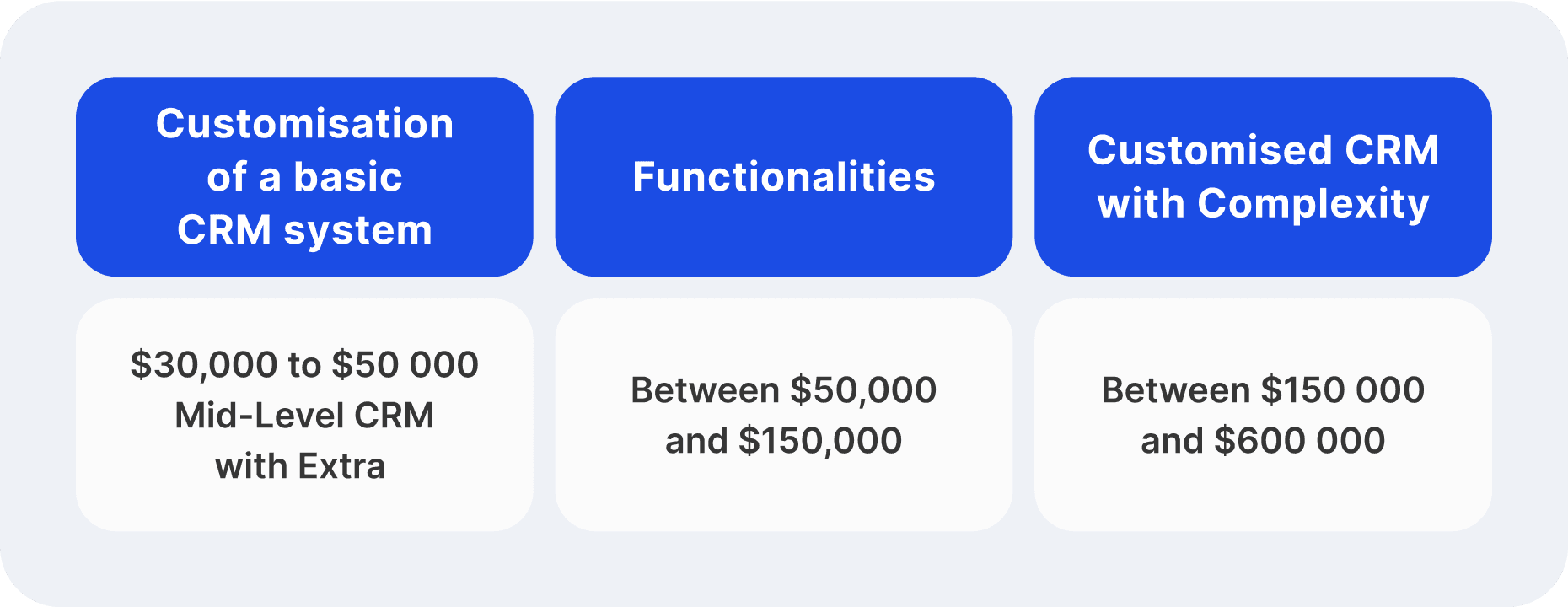
The necessary features, complexity, and development resources are some variables that affect the cost of creating a customised solution. Below is an extensive analysis of the variables affecting the price and related expenses:
The Sales Module contains forecasting, sales analytics, and account management capabilities. The cost varies depending on the feature set, from $5,000 to $40,000. Custom CRM software development takes two to three months.
The marketing module includes campaign management, customer segmentation, and analytics. Its development takes three to four months, and the estimated costs range from $5,000 to $15,000.
The customer support module includes knowledge bases, service analytics, and help desks. Its price range is $5,000 to $31,000, and the turnaround period is two to three months.
Resources for Development
Using an in-house team requires paying more for fixed costs because it requires hiring specialised developers, project managers, and designers. Although freelancers offer greater flexibility, their timeliness and quality may vary.
While they provide many services, full-service agencies are usually the most costly choice.
Expenses Before Development
Requirements gathering assures that the customised solution aligns with the procedures and business model. System architecture and UI/UX design are included in planning and design.
Linking with Current Systems and Security Protocols
The complexity and expense of development are increased by smooth integration with marketing plans, project management tools, and current systems.
Characteristics include access limits, data encryption, and adherence to privacy laws.
Training Materials and Development Upkeep
teaching employees how to use the CRM system efficiently. The number of personnel and length of training determine costs.
Improvements, system upgrades, and technical support are continuous costs.
Estimated Prices
Here is a broader and more general estimate of prices:
Customisation of a basic system: $30,000 to $50,000
Mid-Level CRM with Extra Functionalities: Between $50,000 and $150,000
Customised software with Complexity: Between $150,000 and $600,000.
Timelines for Development
Basic Systems: three to six months
Advanced Systems: six to twelve months.
Elements like testing and the migration of essential customer data extend the schedule.
[aa quote-global]
Fast Fact
Database marketing, which was invented by Robert and Kate Kestnbaum in the 1980s, marked the beginning of digital CRM.
[/aa]
Key Features of a Custom CRM
Several features keep the best CRM software running.
Lead Management
Efficiently track and nurture potential customers throughout the sales process with technologies that gather essential data and accelerate client acquisition.
Client Segmentation
Develop a personalised experience that satisfies particular business procedures and groups clients according to trading behaviour, investment objectives, or activity levels.
Connections to Trading Platforms
Ensure a seamless interaction with popular platforms like MetaTrader, cTrader, or other trading solutions to simplify complex sales operations..
Advanced Reporting and Analytics
Generate dashboards that display key performance indicators, including client profitability, trade volumes, and insightful customer analytics, to enhance business outcomes.
Tools for Security and Compliance
Use advanced security measures to protect important client data and guarantee that sensitive data is handled under legal requirements.
Tools for Communication
Streamline customer service encounters with integrated email, chat, and phone tracking features to encourage client participation and loyalty.
Automating Repeated Activities
Boost productivity by automating routine tasks such as data entry, follow-ups, and reminders, allowing a focus on customised solutions for complex sales models.
Customisable Interface
Create a framework for customising a CRM system that fits your business model and guarantees a solution specifically suited to your needs.
Marketing Features
Incorporate tools to monitor marketing campaigns, strategies, and consumer behaviours, aligning efforts with overall corporate goals.
Instruction and Assistance
Provide specialised training materials and technical support to help teams effectively implement the customised CRM and integrate it into their daily workflows.
Comparing Custom CRMs vs. Pre-Made CRMs
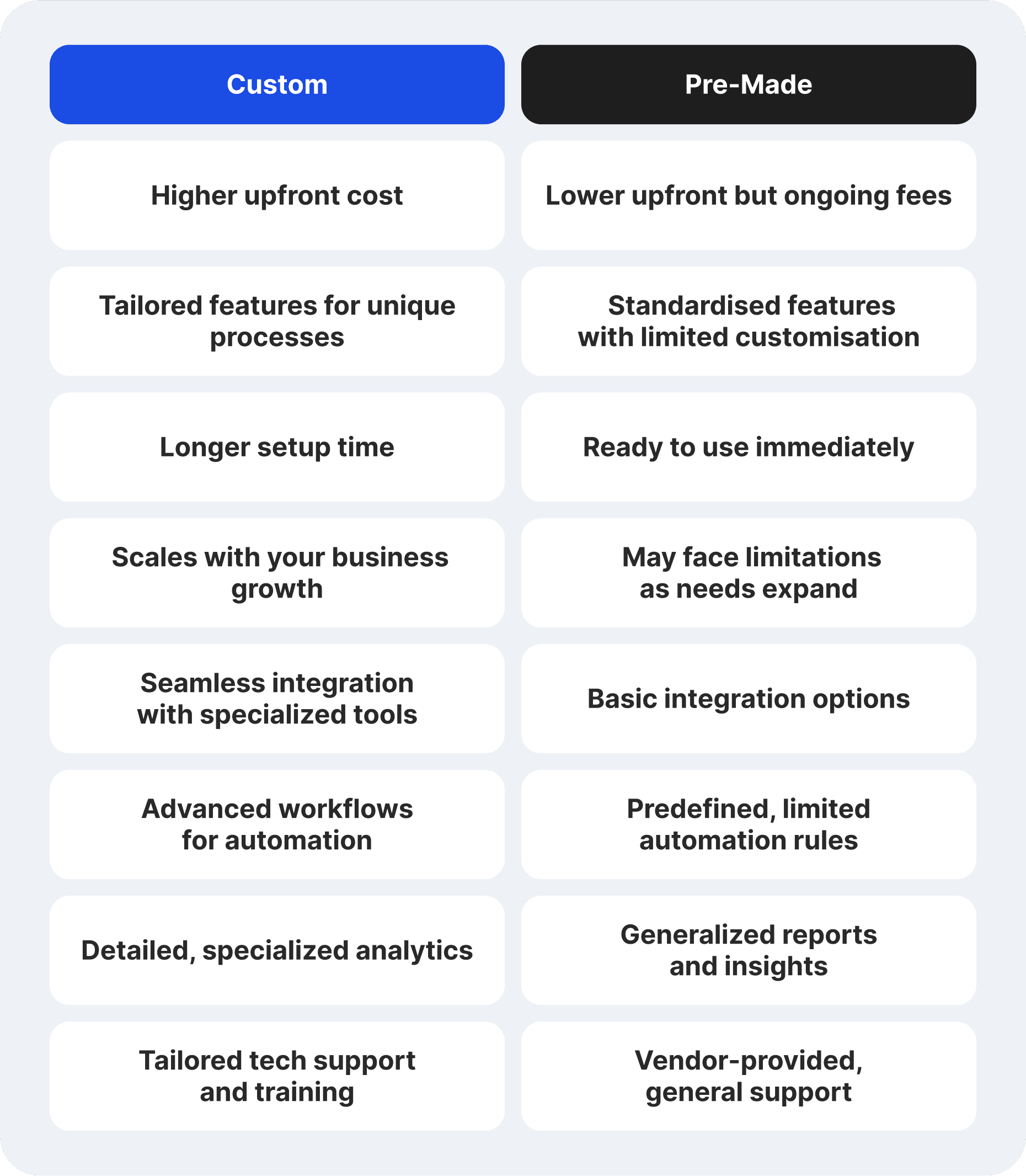
Because of the creation and customisation, custom CRMs have a higher initial cost. Subscription-based CRMs have a reduced initial cost but eventually incur ongoing expenses.
Features in a custom solution are tailored to particular company procedures. Premade products provide standardised functionality with few customisation options.
It takes longer to construct custom CRMs before they are ready for use. After purchasing, ready-made CRMs are immediately usable.
CRM systems that may be customised are made to evolve with your company and your complicated sales procedures. As corporate needs increase, off-the-shelf CRMs may encounter constraints.
Trading platforms and other specialised tools can be seamlessly integrated with custom CRMs. However, basic integration possibilities in off-the-shelf products may not perfectly match specific company procedures.
Custom CRMs automate repetitive chores through workflows. The predefined automation rules used by off-the-shelf CRMs may not be able to handle complex sales models.
Custom CRMs use unique customer behaviour tracking to deliver pertinent data analysis. Off-the-shelf solutions, which place less emphasis on specialised measures, provide generic information.
Tailored tech assistance and specialised training materials are examples of custom solutions. Off-the-shelf CRMs come with vendor-provided training materials and general technical support.
Top CRM Providers
As you understand, building software from scratch can be a burden and requires time, dedication, and resources. That’s why software providers can always be an option.
B2CORE
As the best CRM provider acknowledged in Finance Magnates London Summit 2024, B2CORE offers extensive CRM and back-office solutions tailored for Forex and cryptocurrency enterprises. It facilitates easy connection with KYC providers, wallets, trading platforms, and payment systems. Some of its advantages include a fully customisable interface, financial reporting, and multi-level affiliate programs.
B2CORE offers customised solutions for FX brokers, cryptocurrency brokers, exchanges, and wallets. These solutions benefit businesses through safe transaction monitoring, anti-fraud systems, and round-the-clock technical assistance. They also benefit from deep customisation, repetitive task automation, and compatibility with intricate sales processes.
HubSpot CRM
Small and medium-sized organisations use HubSpot CRM because of its easy-to-use interface and free basic edition. It connects smoothly with sales tools, marketing plans, and customer support correspondence. Some primary features are email marketing, contact management, sales automation, reporting dashboards, and live chat assistance.
HubSpot aims to increase customer engagement by automating monotonous operations and streamlining customer behaviour tracking. Because of its user-friendly design, businesses may better manage customer loyalty and retention. The platform is appropriate for various business activities due to its scalability and reasonable pricing.
Zoho CRM
Businesses can automate tedious operations and manage client connections using Zoho CRM, a customisable system. Workflow automation, AI-based analytics, and customer engagement tools are some of its characteristics.
The platform ensures flexibility in managing intricate sales models by supporting smooth connections with external systems and other Zoho applications. Because of its cost and adaptability, Zoho CRM is a good option for companies of all sizes. Its powerful reporting features offer pertinent information for monitoring consumer behaviour and improving customer support exchanges.
Salesforce CRM
Salesforce CRM is a platform with a wealth of options for marketing, sales, and customer support. Companies may automate tedious chores and match their workflows with intricate sales processes with its adaptable solution. Salesforce supports marketing strategies and customer engagement by offering AI-driven insights, advanced analytics, and consumer behaviour tracking.
Additionally, it easily interfaces with current systems, guaranteeing that it is compatible with various business procedures. The platform provides its users with specialised training materials and continuous technical assistance.
Pipedrive CRM
Pipedrive is a sales-focused platform that simplifies business procedures and client interactions. It emphasises tracking consumer behaviour, customer loyalty, and workflow automation. Pipedrive also offers AI-based reporting solutions, email connectivity, and visual sales pipelines.
The platform offers tech support and specialised training materials to its current users. Its scalability and flexibility might benefit businesses that wish to create a custom CRM for their sales processes.
Last Remarks
Custom solutions offer greater flexibility, scalability, and integration possibilities while meeting particular corporate needs than pre-made systems. They guarantee data security and compliance while streamlining client data management, automating workflows, and supporting complicated sales processes.
Even though the development process takes a lot of time and money, the customised functionality and long-term advantages frequently make the investment worthwhile. Still, there is always another option - software providers who bring multiple solutions to the table.
FAQ
What is CRM?
It manages and analyses customer contacts throughout their lifecycle by combining practices, tools, and strategies.
Why Create a Custom CRM?
In contrast to generic, pre-made solutions, custom software is specifically created to match the needs and processes of a business.
Why Use a CRM?
CRMs streamline processes, allowing teams to concentrate on campaign development, data analysis, and strategy testing for improved outcomes.
Read also

